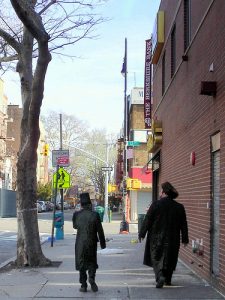Ever since I began this blog a few years ago, I’ve developed the habit of squirreling away things -- a chance remark, a funny incident, an enlightening news article -- for future use. This week’s post, in honor of Tu B’shevat, the New Year of the trees or Jewish Arbor Day, draws on one of those finds: a piece in the New York Times about one orthodox Jewish community’s sensitivity to its fruit trees.

What makes this practice even more commendable is that space in Borough Park is in short supply. Once upon a time, way back in the 1920s, its verdant, leafy streets and capacious single-family homes drew thousands of upwardly mobile, middle class New York Jews. Far more heterogeneous than it is today, Borough Park afforded a congenial environment in which Conservative Judaism as well as Zionism took root.
That would change with the influx of frummer yidn, or ultra-Orthodox Jews, in the 1960s. Bearing large families -- demographers claim that Borough Park has the highest birthrate in the city -- they transformed the neighborhood’s composition as well as its infrastructure. A former byword for the good life, Borough Park is now renowned as a citadel -- and an unusually crowded one, at that -- of Orthodoxy.
Living cheek by jowl isn’t usually conducive to embracing Mother Nature, nor is traditional Judaism, which, historically, places more of an emphasis on internal rather than external matters. Under the circumstances, then, the concern displayed by contemporary Borough Park residents for their physical surroundings is to be applauded.

